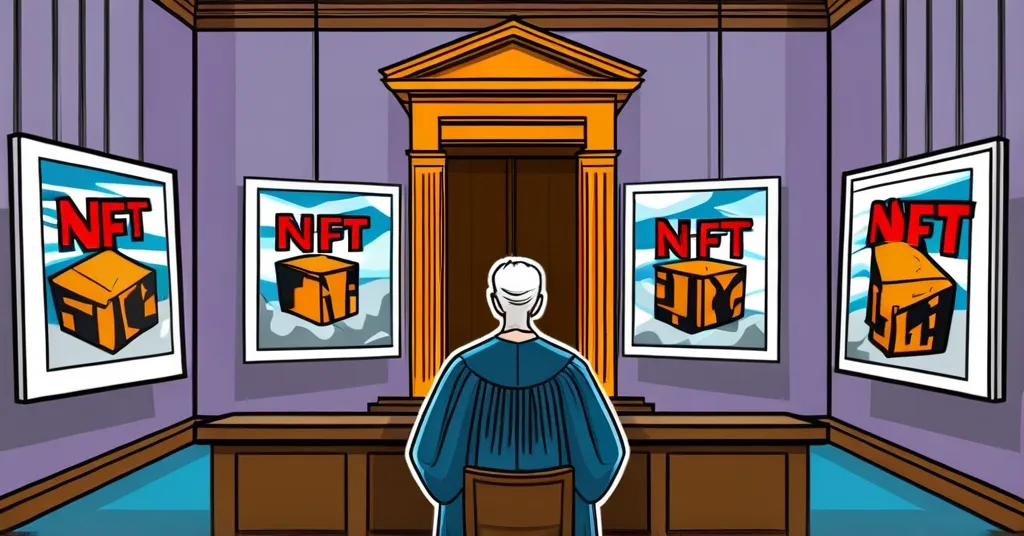Eden Gallery Battles NFT Holders’ Lawsuit Over Meta Eagle Club Value Crash

Eden Gallery Fights Back Against NFT Holders’ Lawsuit Over Meta Eagle Club
Eden Gallery has moved to dismiss a lawsuit filed by over 40 NFT holders of the Meta Eagle Club, asserting that any losses were due to market forces rather than fraud.
- Eden Gallery denies responsibility for NFT losses
- Over 40 NFT holders sue over alleged “rug pull” scam
- Meta Eagle Club NFTs plummet from $1,800 to $17
Imagine buying a digital eagle for $1,800 only to see its value plummet to just $17. That’s the harsh reality for many Meta Eagle Club NFT holders who now accuse Eden Gallery and artist Gal Yosef of orchestrating a “rug pull” — a scam where developers abandon a project and run away with investors’ money. The lawsuit, filed in a New York federal court, seeks damages ranging from $1,224 to $70,219 per claimant.
The Meta Eagle Club, which sold 12,000 NFTs and raised $13 million from February 2022 to November 2023, promised more than just digital art. It was pitched as a private, members-only club in the metaverse, complete with exclusive trips, giveaways, and parties at Eden Gallery locations worldwide. The project also touted the development of the “Galyverse,” an online world, and the launch of a cryptocurrency token called $WING. However, these grand promises became the crux of the plaintiffs’ allegations of fraud and misrepresentation.
The Allegations
The plaintiffs, represented by Wolf Popper as co-counsel, accuse Eden Gallery, Cathia Klimovsky, Guy Martinovsky, Gal Yosef, and Cetra Art Corporation of making misleading statements and omitting crucial information about the project’s development. They claim common law fraud, unjust enrichment, and violations of New York’s General Business Law § 349, asserting that the defendants pulled off a classic “rug pull” by raising funds without delivering on the project’s ambitious goals.
Eden Gallery’s Defense
In their motion to dismiss filed on January 7, Eden Gallery contends that the plaintiffs’ losses, if any, are due to market forces rather than fraudulent activities. They argue that each claim falls below the required $75,000 threshold for the court’s jurisdiction and that combining claims is not permitted. “Plaintiffs may have buyers’ remorse (even though the NFTs were a digital art product rather than an investment product), but their losses, if any, are due to market forces,” the gallery stated.
Eden Gallery’s defense is rooted in the volatile nature of the NFT market. According to CryptoSlam, the NFT market is now worth just 2% of what it was at its highest point in early 2022, despite a recent uptick due to the crypto market’s bull run. This significant downturn supports the gallery’s argument that the value drop of Meta Eagle Club NFTs from 0.6 ETH ($1,800) at launch to a measly 0.0051 ETH ($17) currently is a reflection of broader market trends rather than deceit.
Implications for the NFT Market
This legal battle shines a spotlight on the broader issues of transparency and trust within the NFT ecosystem. The allure of quick riches often overshadows the underlying risks, as seen with the Meta Eagle Club’s promise of trips and parties, which turned out to be a financial trip for many NFT holders. The case raises questions about accountability in the relatively new and unregulated world of NFTs, where the line between legitimate market fluctuations and fraudulent schemes can blur.
As the crypto world watches closely, this lawsuit could set a precedent for future disputes in the NFT space. It’s a stark reminder that while the potential for innovation and disruption is immense, the path to decentralization and financial freedom is fraught with challenges that require both optimism and a healthy dose of skepticism. The crypto revolution thrives on the promise of shaking up the financial system, but with great disruption comes great responsibility.
Broader Context of NFT Scams and Rug Pulls
The Meta Eagle Club case is not an isolated incident. The crypto industry has seen numerous instances of “rug pulls” and other scams, such as the infamous Squid Game token and the Frosties NFT project. These cases highlight the need for clearer regulations and transparency in the NFT market, as they underscore the risks of investing in digital assets based on promises of future developments.
Legal experts like those at Wolf Popper emphasize the potential for holding NFT issuers accountable for misleading promotions. Market analysts, supported by data from CryptoSlam, argue that while market forces play a role, the allegations of fraud suggest a need for deeper investigation into project management and promises.
Key Takeaways and Questions
- What is Eden Gallery’s main defense in the lawsuit?
Eden Gallery argues that the plaintiffs’ losses are due to market forces, not fraud or misrepresentation.
- How significant was the drop in value for Meta Eagle Club NFTs?
The value of Meta Eagle Club NFTs dropped from 0.6 ETH ($1,800) at launch to 0.0051 ETH ($17) currently.
- How much money did the Meta Eagle Club NFT collection raise?
The collection raised $13 million from February 2022 to November 2023.
- What is the current state of the NFT market according to CryptoSlam?
The NFT market is now worth just 2% of what it was at its highest point in early 2022, despite recent increases driven by the crypto market bull run.
- Why did the NFT holders sue Eden Gallery and Gal Yosef?
The NFT holders sued alleging fraud, a “rug pull,” and seeking damages for overpaying due to misrepresentations.
In the grand scheme of things, this lawsuit isn’t just about a bunch of digital eagles — it’s a battle for trust and integrity in the wild west of crypto. As Bitcoin maximalists, we’re all for shaking up the financial system, but let’s not forget that with great disruption comes great responsibility. Whether Eden Gallery’s defense holds up or the NFT holders win their case, one thing’s for sure: the crypto revolution will keep pushing forward, with or without the Meta Eagle Club.



